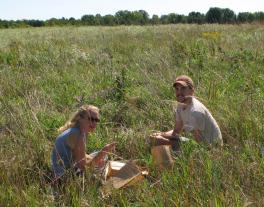BS in Evolution & Ecology
Evolution and Ecology are areas of study into the descent and interrelationships of organisms, including plants, animals, and microorganisms.
The study of evolution deals with both the historical path of evolution from pre-biotic earth to the present, and the processes contributing to evolutionary change, such as natural selection, genetic drift, and historical accidents. The study of ecology concerns how organisms function in their dealings with other organisms and with their environment. Ecology is one of the key sciences having to do with the broader field of conservation biology and the maintenance of biodiversity.
The Evolution and Ecology (EE) major requires that students complete core courses offered by the department in evolution, ecology, organismal diversity, and a senior seminar in evolution and ecology. Courses in molecular genetics and statistics are also required. Students are required to take two additional courses in organismal diversity focusing on vertebrate animals, non-vertebrate animals, or plants, and a third course in evolution or ecology. These courses may be drawn from a broad list offered within and outside of the Department of Evolution, Ecology, and Organismal Biology. The remainder of the 30 credit hours needed for the Evolution and Ecology Major can include additional evolution and ecology courses, independent research, or courses in related areas (e.g., Anthropology, Natural Resources, Geological Sciences, Atmospheric Sciences, etc.) and must be approved by the student's major advisor.

Students completing the Evolution and Ecology degree would be well qualified for employment in businesses dealing with the environment, such as ecological assessment and research, in non-profit environmental organizations, or working in state or federal environmental agencies. They might also work in zoos or aquaria, or as laboratory technicians in biological or pharmaceutical research. The Evolution and Ecology major would serve as an excellent foundation for pursuing graduate study in biology, particularly in the areas of evolution and ecology, or in teaching. Other students with this degree may plan to enter a professional school in medicine, veterinary medicine, dentistry, or similar occupation.
- Evolution and Ecology Major Program (BS)
- Additional Sources of information
Evolution and Ecology Undergraduate Admissions listing
